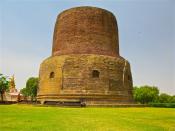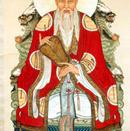Taoism and Buddhism are the two great philosophical and religious traditions that originated in China. They are alike and yet different in many ways.
One dominant concept in Taoism and Buddhism is the belief in some form of reincarnation. Reincarnations, life after death, and beliefs are not standardized.
The goal in Taoism is to achieve Tao, to find "the Way". Tao is the essence of everything that is right, and complications exist only because people choose to complicate their own lives. Desire, ambition, fame, and selfishness are seen as hindrances to a harmonious life. Eventually the hope is to become immortal, to achieve Tao, to reach the deeper life. The origin of the word Tao can explain the relationship between life, and the Taoism concept of life and death. The Chinese character for Tao is a combination of two characters that represent the words as head and foot. The character for foot represents the idea of a person's direction or path.
Finally, the character for Tao represents the Taoist idea that the eternal Tao is both moving and unmoving. Taoism upholds the belief in the survival of the spirit after death. Applying reincarnation theory to Taoism is the belief that the soul never dies, a person's soul is eternal. In the writings of the Lao-Tzu Te-Tao Ching, Tao is described as having existed before heaven and earth. By divesting oneself of all external distractions and desires, only then can one achieve Tao. In ancient days, a Taoist that had transcended birth and death, achieved Tao, was said to have cut the Thread of Life. In Taoism, the soul or spirit does not die at death. The soul is not reborn; it simply migrates to another life. This process, the Taoist version of reincarnation, is repeated until Tao is achieved.


